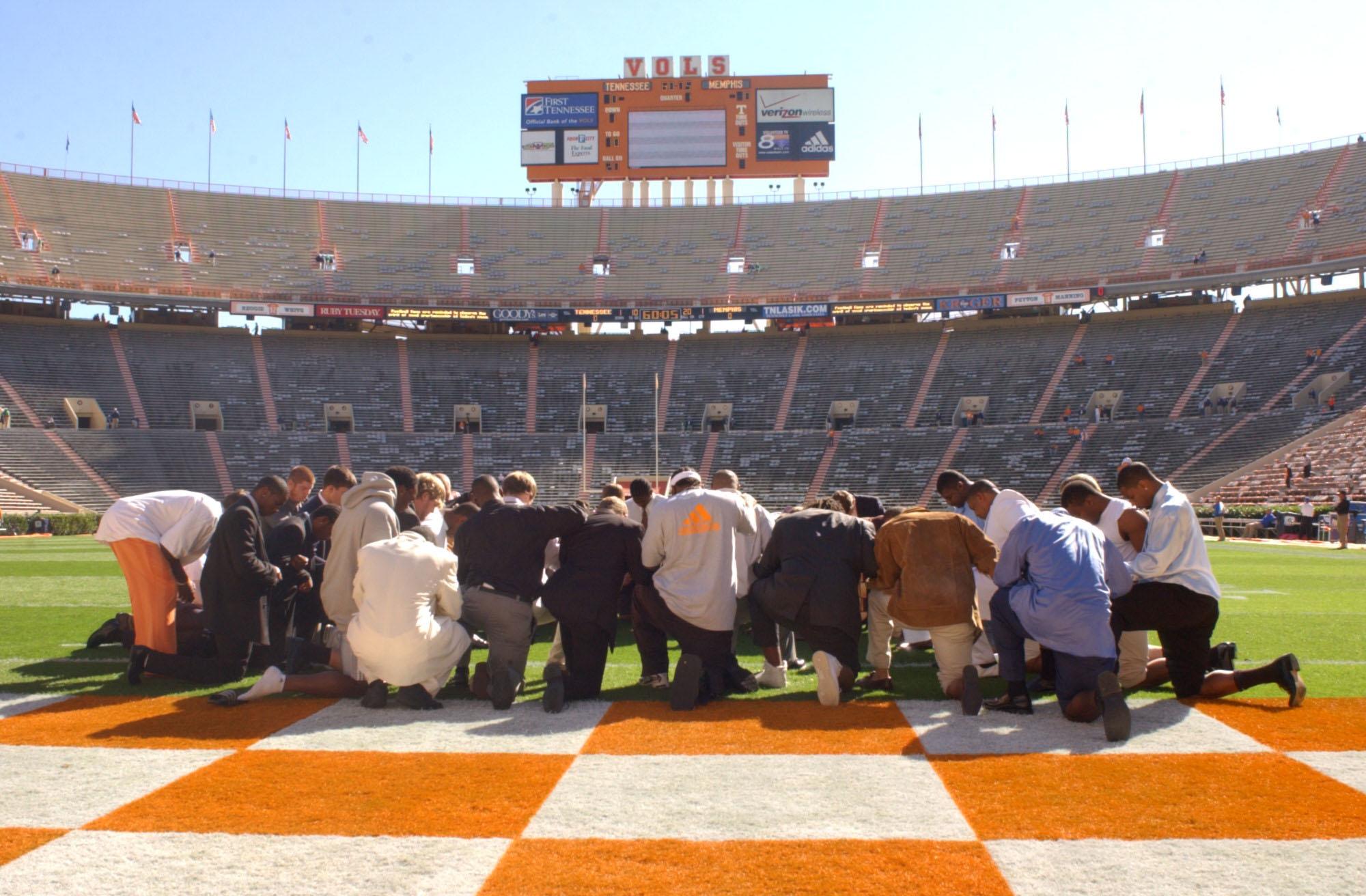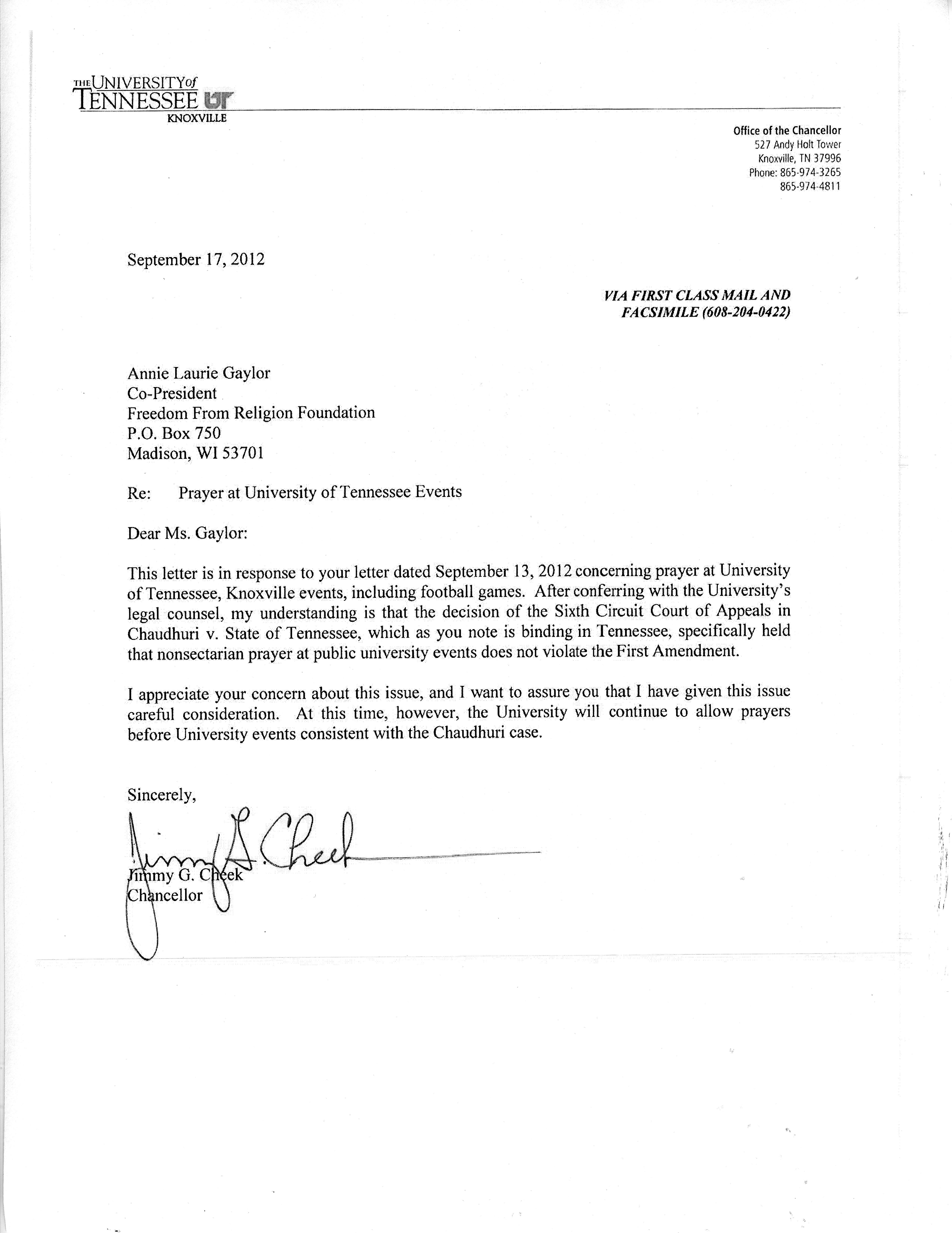The new atheism and UT football
Friday, January 1, 1904
PRAYER AND FOOTBALLBut can they still throw the "hail Mary?"• The University of Tennessee endorses nonsectarian prayer before football games and says it will continue the practice.• The University of Georgia stopped praying before football games in 1989.• The University of Mississippi once allowed prayer before football games, but ended the practice many years ago.• The University of Alabama doesn't pray before football games.Source: Media relations at each schoolLAYING DOWN THE LAWImportant U.S. Supreme Court cases about religion in the schools• Engel v. Vitale (1962): Prohibited recitation of a school-sponsored, nonsectarian prayer as violation of Establishment Clause ban on government creating and sponsoring religious activity.• Epperson v. Arkansas (1968): Overturned statute prohibiting the teaching of evolution, on basis that government sought to ban material objectionable to a particular religion.• Widmar v. Vincent (1981): Ruled that a state university could not exclude a student group from using school buildings on the basis of the group's religious viewpoint.• Edwards v. Aguillard (1987): Overturned statute requiring teaching of both evolution and creationism, concluding that the law impermissibly promoted a particular religious belief.• Lee v. Weisman (1992): Prohibited school-sponsored prayer delivered by invited clergy at a school commencement, on the grounds that graduating students were being forced to participate in a religious ceremony.• Santa Fe Independent School District v. Doe (2000): Ruled that public schools may not sponsor student-recited prayer at athletic contests or other school events.Source: Pew Forum on Religion and Public Life
Tennessee had to be a tempting target.
The state has twice as many evangelicals as the national average. More than Alabama, Georgia and Mississippi, too.
And in objecting to prayers offered at Neyland Stadium before every game, anti-religion forces were able to take on two sacred institutions - Christianity and UT football.
Annie Laurie Gaylor, co-founder and co-president of the Freedom From Religion Foundation, said universities are the holdouts clinging to offensive tradition.
Even after prevailing in countless cases in the last 35 years, a victory over the Vols would be something to brag about.
There has been a flurry of challenges to prayer in Chattanooga in recent months, culminating with a letter to the University of Tennessee at Chattanooga demanding an end to its pregame ritual. UTC officials were quick to change to a moment of silence.
"This is creating real ripples in a region," said Bryan Barkley, a Christian turned atheist who helps lead a small secular student group on the UTC campus and aggressively pushed for the praying to end. "We aren't the 100 percent Judeo-Christian community we were decades ago."
Officials at UT's flagship Knoxville campus got the same letter but said university prayer doesn't violate constitutional rights, with this caveat: It will remain generic in nature, said Chancellor Jimmy Cheek.
But the irreligious aren't going away. In fact, we can expect more such activity from secularists.
Charles Haynes, senior scholar at the First Amendment Center based in Nashville, said Gaylor and Barkley and their followers are part of a new atheism that is growing in numbers and is increasingly organized.
They don't want to tolerate prayer, preaching or mentions of God's providence. They want to counter faith and criticize it, like authors Richard Dawkins and Christopher Hitchens have done.
And their point of view is getting more sympathy among young adults, who don't share the religious loyalties of their parents.
A 2010 survey by the Pew Forum on Religion and Public Life said one in four adults under 30 describes himself as atheist, agnostic or nothing in particular. The number of atheists in their 30s, 40s and 50s is much smaller.
In all, 16 percent of U.S. adults are not linked to a religious group. Only 1.6 percent say they are atheist, according to Pew.
But it's a potent faction, Haynes said.
"They say, 'We are no longer going to accept being second-class citizens,'" he said.
•••
Just mention the issue, and emotions flow.
A Chattanooga Times Free Press request for opinions on public prayer elicited a number of online responses. Among them:
"It goes to show that we are no longer one nation under God."
"Christians have become such drama queens. No one is stopping you or your children from praying."
"It makes me sad that we Christians are being pushed down for what we believe."
"Matthew 6:6 makes it very clear that Christians are supposed to pray in a quiet space where they are alone, instead of 'babbling like pagans.' Nothing I've ever read of Jesus commands Christians to pray in public."
Haynes said this is typical. Often he is asked to mediate in towns where the faithful and the faithless can't come to terms.
Those who don't believe in a god and say religion is poisoning America demanded that Soddy-Daisy High School officials stop praying at events in 2010. In recent months, protesters have sought to stop the Hamilton County Commission from praying. A cease-and-desist letter went to Ridgeland High School in August because the Freedom From Religion Foundation said it had received complaints about the football coach taking players to churches for pregame meals.
The Hamilton County Commission case has wound up in court, but the others have not -- not yet, at least. The threat of legal action is often enough to force believers to back down.
In the K-12 cases, groups such as Freedom From Religion usually have had the law on their side. School administrators and teachers are not allowed to lead prayers or incite religious behavior. The Supreme Court has ruled that those actions equate to the state sponsoring one faith over another.
Young children and teens are considered a captive audience. Truancy laws require them to be at school ,and they are impressionable, said Haynes.
Still, it is wrong to assume that prayer is outlawed in public schools, Haynes said.
Students can give out religion tracts. They can pray anywhere they want. They can organize Bible clubs. High school students can even lead prayer during graduation speeches as long as their teachers and administrators didn't influence them.
Universities are another animal.
Although plenty of people want to rid state-funded universities of graduation and pregame prayers, courts have upheld schools' right to continue them as long as they are nonsectarian or generic, according to Chaudhuri v. State of Tennessee. Bottom line, pastors can't finish their prayer "in Jesus' name," said Haynes.
Court decisions have said that college-age students are old enough to know that a prayer doesn't equate to a state endorsement of religion. It's part of a theistic tradition, Haynes said, just like the mentions of God on the dollar bill or in the pledge.
Still, groups such as Freedom From Religion and the Secular Student Alliance want to erase mentions of God.
Gaylor wants to see UT students push to get rid of prayer altogether. And it will take local agitation to get that done, she said.
"We think players should play, not pray." she said. "Religion is private, and government is supposed to be neutral."
•••
Gaylor, who said she is a third-generation atheist, had her first victory over religion in public life when she was a college sophomore. In the 1970s, she pressured the University of Wisconsin-Madison to drop prayer from graduation, and it never came back.
"I have never prayed," she said. "I believe we were all born atheists."
In the three decades since her organization formed, she has received more publicity and more funding. Membership has grown from just two in the beginning to 19,000 today, she said.
Her staff and lawyers have sent so many warning letters over the years that she can't remember who has gotten one and who hasn't.
The foundation has taken 60 cases to court. According to its website, its major victories include winning the first federal lawsuit challenging direct funding by the government of a faith-based agency, overturning a state Good Friday holiday, removing Ten Commandments monuments and crosses from public land, getting rid of a nativity scene from the entrance of a city hall and ending 51 years of Bible instruction in Rhea County, Tenn., schools.
Most cases originate from a complaint in the community.
And victory in one community can lead to activity in neighboring towns.
That is what's happening in Chattanooga.
The calls keep coming.
Callers who are put on hold hear the organization's message in a recorded ditty:
"Beware of dogma it has a bite. ... Beware of dogma it'll trap your mind. ... Religion dogma it'll make you blind. ... It's not designed to let you think for yourself."
•••
Before the Freedom From Religion Foundation, Tennessee communities were already getting into tangles with the American Civil Liberties Union and Americans United for Separation of Church and State.
Religion here is important to more residents than in almost any other state. Seventy percent surveyed by Pew said they pray every day, and almost half said they get answers to those prayers. Seventy-two percent said their religious beliefs and practices are very important.
Still, schools like UTC increasingly are sensitive to the minority.
Officials at UTC said they were told that each UT campus could make its own decision about football game prayer. UT went one way. UTC went another.
The faculty senate, along with students, pressured the administration, said Chuck Cantrell, a spokesman for UTC.
"Because of the level of diversity, we felt it was the right direction," he said.
Chris Walker, the campus director for the Fellowship of Christian Athletes, said he isn't upset with UTC officials. They did what they thought best.
Heads still will bow, though, said Walker.
At the first game following the UTC decision, a handful of padded players asked Walker to pray with them.
He did.

